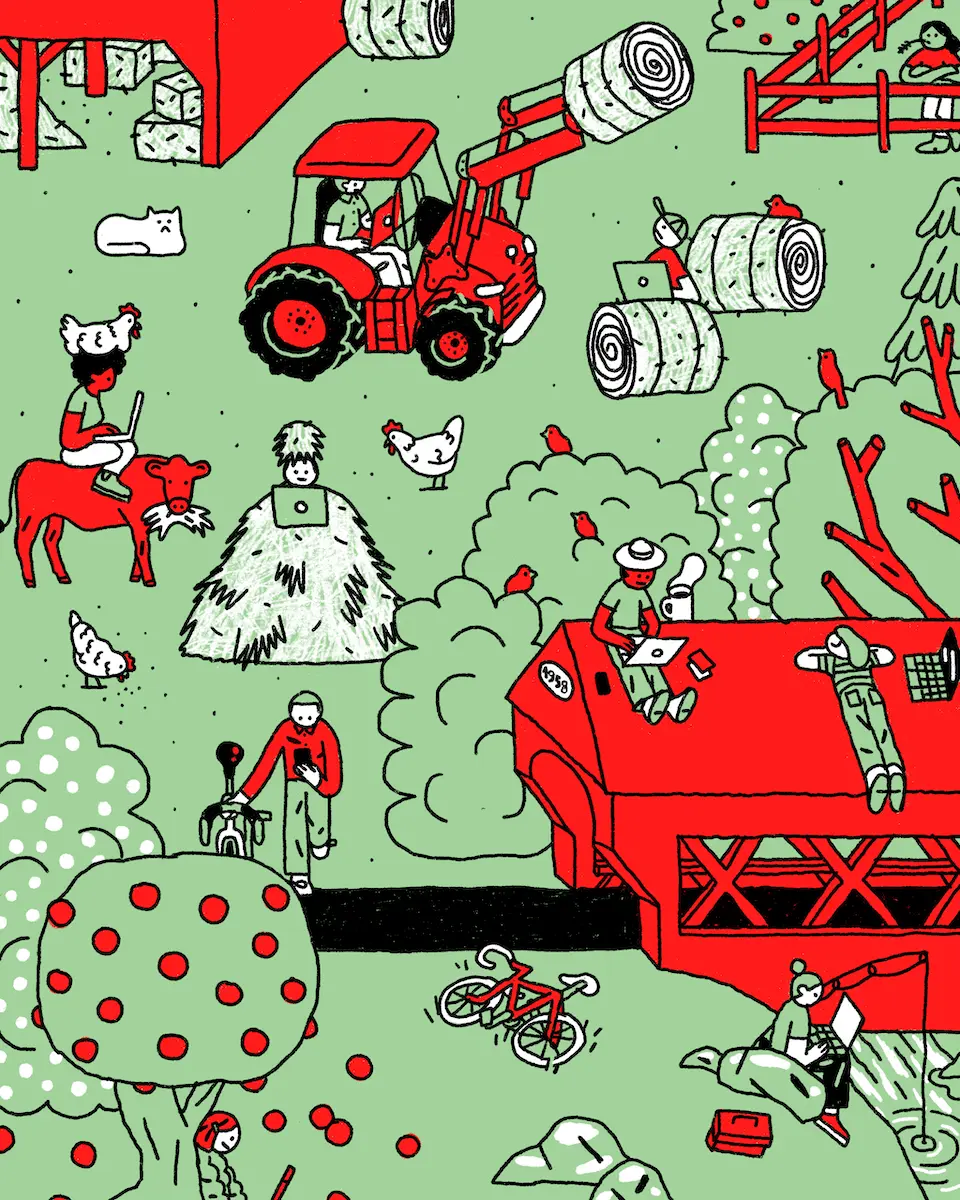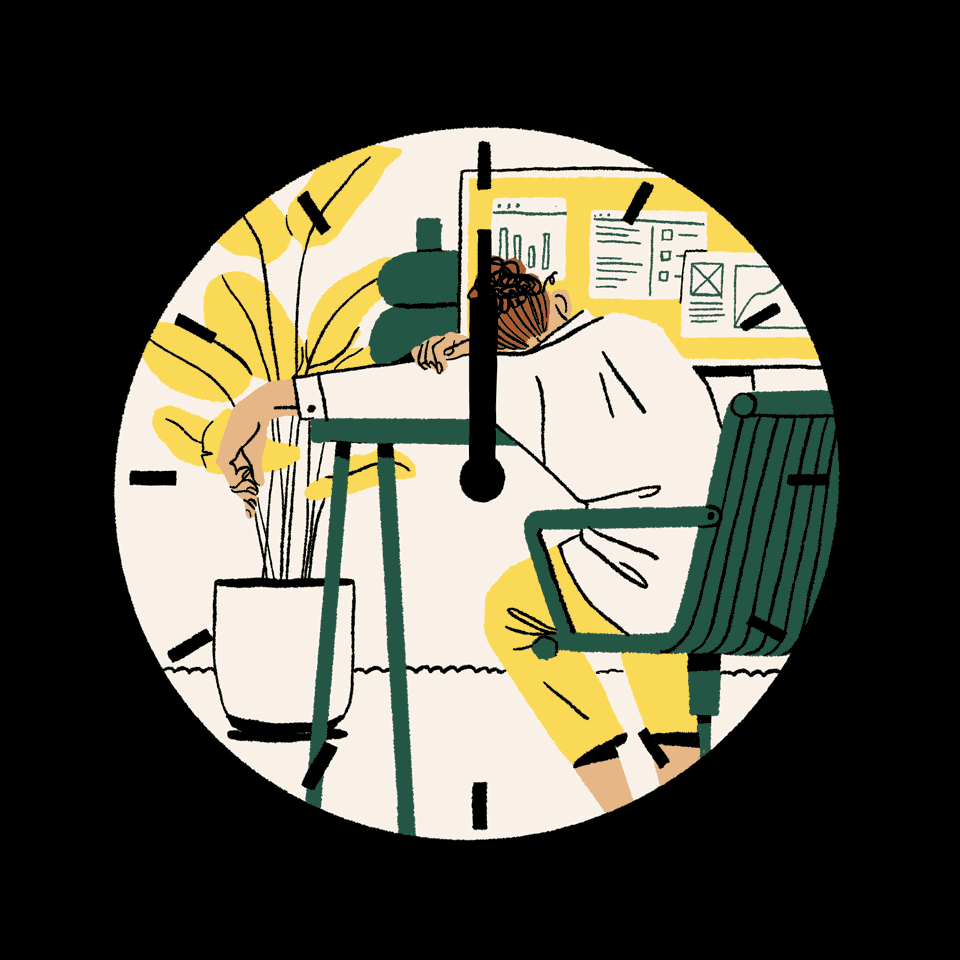
The last year taught us that lots of our jobs can be done from a lakeside barn or mountaintop chalet. For some, those dreams turned reality are reshaping their vision of the future.
When it became apparent in early 2020 that working from home wouldn’t be a passing phase, Stuart Andrew and his wife started feeling the cramp of their New York City apartment. Their 500-square-foot, one-bedroom space in Brooklyn didn’t provide enough room for two people and a cat to live, work, and relax 24/7.
“Our kitchen table and stools became our office,” says Stuart, who works as a journalist in the city. The two worked across from each other, not feeling safe enough in the early days of COVID to venture out into shared rooms in the building. “The other crushing thing for us was that we lived right across from a dog park, which, when trying to work, became intolerable for me,” says Stuart, who describes himself as sound sensitive.
The stress of the city had begun to wear on the couple. Both Canadians and nature-lovers, he and his wife had always imagined eventually moving somewhere more remote but were pulled to the city for its job opportunities. Now a chance to start living the simpler life they’d dreamed of while maintaining their careers seemed possible, if even only temporarily.
“I got it in my head that there was an opportunity to take advantage of this moment, and even though it was difficult to envision seizing it, we should try.” So the two broke their lease, put most of their belongings in a storage unit, and moved to the first of many rentals they would inhabit over the next year.
Their life felt palpably different right away. In Sainte-Cécile-de-Masham, a tiny village in Quebec, there weren’t innumerable restaurants lining the streets, but they did have access to a wealth of outdoors activities—hiking, canoeing—just outside their doorstep. And while there were no world famous landmarks, there was a charming 50-foot covered bridge, the kind you’d find on a postcard.
“Instead of looking at a dog park, we were looking at a national park,” says Stuart. Rolling hills, gorgeous sunsets, and no neighbors in sight—“it was the perfect first spot,” he says. From there, the pair bounced around almost monthly: Pennsylvania, back to New York, then over to Hamilton, Ontario, only to end up back in Quebec.
By January, the benefits of small-town life had convinced them never to return to the city, and they weren’t alone in their pursuit of a different pace, lower cost of living, and a taste of something new. For some, the pandemic suddenly made taking chances possible, but all of these steps forward were taken on the shaky foundation of open-ended remote work, with no certain future in place.
Finding a better balance
Chances are you know someone who has moved in the past year. The act was so commonplace, a Pew Research Study found that 22% of Americans changed residence or knew someone who changed residence due to the pandemic, with New York representing the state with the highest percentage of outbound moves in 2020. These moves were either forced due to loss of housing or income, or they were made possible by seven in 10 employees working remotely all or most of the time.
“Instead of looking at a dog park, we were looking at a national park.”
Because we saw that it could be done, 97% of employees continue to want some degree of flexibility between returning to an office and working from home. Some companies recognize the desires of the overwhelming majority of the workforce and are providing increased workplace flexibility, not requiring anyone to return to their desks full-time.
But not every company feels the same, citing a dearth of creativity, spontaneity, and camaraderie that they believe breathes life into company culture. Some businesses are bringing everyone back into the office, even if they expect to lose employees over the choice. And they should expect a loss or two—remote work, and the choices it’s enabled people to make about their living situations over the past year, is emboldening people to simply quit altogether if the job no longer aligns with their priorities. This might be considered a bold move with 8.5 million U.S. jobs missing from before the pandemic, but that should only demonstrate the power and appeal that a more balanced relationship between work and everything else can represent.
But what about people like Stuart who want to hold onto a life that feels healthier for them, but who also love their careers? The choice becomes much harder—it no longer seems about work-life balance, but about work versus life.
Quality of life
Stuart noticed that once he’d moved out to the country, his mental health improved. “Nature has been really good for me,” he says. “It’s peace, tranquility.” This more relaxed pace shows up some days in the way he does his job. “The lack of a commute and stress of the city makes an improvement in my day.” The only commute he’s been doing lately is down the river after work, a welcome respite after working in a newsroom during a year of bad news.
Certainly, that slower pace of life translates to a difference in the types of services offered—like the time they called the local pizza joint for dinner, and were told “we’re out.” But those kinds of minor inconveniences are barely a blip to Stuart. “I can’t imagine going back,” he says.
Luckily for him, internet access has been better than expected, something he had been concerned about upon leaving the city. “It’s been surprisingly good, coming out to the middle of nowhere across from a national park and your internet is just as good as New York City,” says Stuart. Only one of their rentals caused problems in terms of connection. “Sometimes we would tether our phones to get things done because it wasn’t suitable,” he says.
“If I'm not in the office, is it going to feel more like a job and not a career?”
Not everyone who embraced the small town life is quite so fortunate. Only two-thirds of rural Americans have a broadband connection at home, and access to high-speed internet is an even greater issue. A stark contract to city life, this points to a larger inequity that will affect remote workers until critical infrastructure extends across the country.
While internet speeds have slowed country-wide with so many people using their home WiFi for work, remedies for urbanites experiencing the crawl, like signal boosters and tethering during peak hours, aren’t long-term solutions for the remote work crowd. Another point of friction for the newly distributed workforce? Uncertainty.
For many newly rural urbanites, the prospect of embracing a life that feels healthy and meaningful can come with a list of internal questions. What if I find my dream town but it doesn’t have the services I need to do my job? Will I have to choose?
The long game
These are the kinds of worries that pass through Stuart’s mind, as he looks for a more permanent place where he’s been renting: “What if the industry collapses?” he wonders. “If we’re in the middle of farmland and nothing's there, are we going to be able to get other jobs?” And—best-case scenario—if everything remains stable, if the internet is fast, and cost of living is low, will his work be affected in other ways?
“If I'm not in the office, is it going to feel more like a job and not a career?” asks Stuart, who has enjoyed the sense of balance he’s found but is still used to identifying himself by his credentials first, and then by everything else. For now, with most people in his office still working from home, the playing field feels equal, but if remote turns to hybrid turns to in-office, what happens to those who made permanent moves? “There’s a lot of uncertainty about how much the center of gravity goes back to the office when more people are there.”
In 2020, as the pandemic rolled on, remote workers continued to decide if it was worth the risk. By the end of the year, almost half of Americans said they’d choose a rural lifestyle over that of a city—that number is up from 39% in 2018. These “amenity migrants” (or some might say gentrifiers) come to enhance their quality of life and in doing so might bring with them an influx of talent and a way to diversify small towns—but they also apply pressure to municipal services and drive up housing prices. Some cottage-country areas of Canada have seen a 70% increase in housing prices in just a year; the Houston, Texas housing market gained $42B in value in 2020; and 80,000 people moved to Phoenix just last year.
For those remote workers now locked into mortgages in towns with fewer in-person opportunities than the cities they left, all eyes are on the future of work.
Those housing challenges make it difficult for small businesses providing minimum wage jobs to find staff able to pay rent in the area. Other towns are dealing with water shortages and the need for increased wastewater infrastructure to keep up with booming populations. Locals also wonder if these moves are a pandemic solution, or if the newcomers are there to stay and invest in the communities growing to fit their demand.
When a home near their rental sold for $95,000 over asking price, Stuart witnessed firsthand the effect that newcomers like him had on the area. “We were renting from people who had lived here their whole lives and they were blown away,” he says. Normally, a local told them, you put a house on the market where it sits for a month or two before selling under asking. Not anymore. For those remote workers now locked into mortgages in towns with fewer in-person opportunities than the cities they left, all eyes are on the future of work—what services are available and what senior leaders decide is best for their companies are evolving considerations.
For Stuart, one of the many battles of choosing between life priorities and work opportunities, aside from the rising cost of rural living, is a mental one. “Even though it’s been good for my mental health, in the past when people go remote, it’s seen as taking a step back,” he says. “You’re not a real contender in the running for anything anymore.” This part of the switch—questioning ingrained mindsets around work—will certainly be an uphill battle for many.
Still, as long as they’re able to rent a peaceful place with strong internet and he can remain productive, flexibility has won out for Stuart. The shift brought on by the pandemic has opened him and many others up to benefits they’re willing to rearrange their lives for.
“I'm never going back to New York City,” he says. “You couldn’t pay me to go back!”


